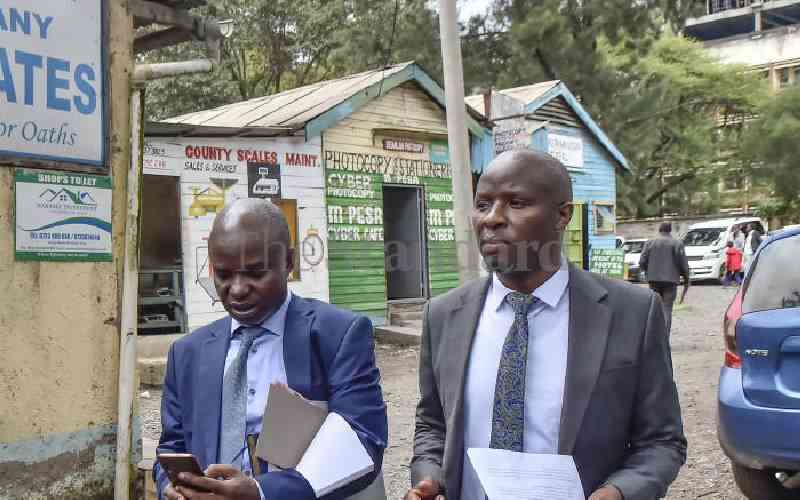The High Court has allowed the Government to sign a banknote printing deal with De La Rue.
This was after the court dismissed a case that has derailed the project for more than three years on grounds that the applicant - Kituo cha Sheria - failed to prove that the tendering process was marred with irregularities.
In her ruling, Justice Mumbi Ngugi said Kituo cha Sheria and the second petitioner, Charles Kioko, had not submitted evidence to show that the decision to award the contract to De La Rue was made by the Government single-handedly without input from the Central Bank of Kenya as alleged by the lobby.
“In my view, the role of the Central Bank to that of the Government in general and the Cabinet in particular is one that requires co-operation, collaboration and information sharing. In the absence of evidence that the decision alleged to have been made on the basis of a Cabinet memo was made at all, or was made without input from Central Bank, it is difficult to see a basis on which the court can declare the said decision null and void,” the judge said.
The contentious deal in 2006 was to see the State gain a 40 per cent stake in the British firm, but the group filed the case in a bid to stop the Government from completing the agreement, saying there were no consultations and public participation as enshrined in the 2010 Constitution.
In the petition, the lobby told the court that it had sought information from the Government as to who owned the money printing company but it never got any response. It wanted the court to order the Registrar of Companies to produce and make public De La Rue’s top investors.
FORMAL REQUEST
On the other hand, Thomas De La Rue, who was the fifth respondent, CBK (the first respondent) and the Attorney General submitted that the firm was a private entity and there was no formal request for information on who owned it.
They further asserted that the right to information was not a blanket cover for the petitioners to seek information they were curious about but had not requested for. Ngugi in her ruling criticised the petitioners for failing to produce concrete evidence in the case.
“With tremendous respect to the petitioners, media articles, taken alone, are of no probative value and do not demonstrate any effort on the part of the petitioners to demonstrate violation of the Constitution by the respondents,” she said.
The lobby said the decision was made based on the then Cabinet’s influence and that CBK had not been allowed to voice its concerns about the deal. They also wanted documents on how the deal was struck, arguing that taxpayers had a right to know how their monies were spent.
Kituo cha Sheria had questioned the procurement process, saying the tender should have been advertised publicly to ensure transparency in the process.
“The petitioners have alleged violation of public procurement laws. On the basis of the documents before me, it is difficult to see how such violation occurred. There is no evidence that the alleged contracts had been entered into, and if they had, whether the process was indeed in violation of the law that regulations procurement,” Justice Ngugi ruled.
Before the court, CBK’s lawyer Waweru Gatonye in his submissions said the lobby had filed its complaint in the wrong place and should have moved to the Public Procurement Administrative and Review Board instead of the courts.
“I am constrained to agree with the respondents on this, the Public Procurement and Disposal Act 2005 contains very clear provisions with regard to public procurement. Should there be violation of its provisions, it does not amount to a violation of constitutional provisions,” the judge said.
Stay informed. Subscribe to our newsletter
The decision by the court means CBK can procure from the firm the new-generation currencies. Kituo cha Sheria had listed the National Treasury, CBK, the Finance minister, De la Rue, the AG and the Registrar of Companies as respondents, whereas Kenya Union of Printing, Publishing, Paper Manufacturing and Allied Workers Union were placed as the interested party.
 The Standard Group Plc is a
multi-media organization with investments in media platforms spanning newspaper
print operations, television, radio broadcasting, digital and online services. The
Standard Group is recognized as a leading multi-media house in Kenya with a key
influence in matters of national and international interest.
The Standard Group Plc is a
multi-media organization with investments in media platforms spanning newspaper
print operations, television, radio broadcasting, digital and online services. The
Standard Group is recognized as a leading multi-media house in Kenya with a key
influence in matters of national and international interest.
 The Standard Group Plc is a
multi-media organization with investments in media platforms spanning newspaper
print operations, television, radio broadcasting, digital and online services. The
Standard Group is recognized as a leading multi-media house in Kenya with a key
influence in matters of national and international interest.
The Standard Group Plc is a
multi-media organization with investments in media platforms spanning newspaper
print operations, television, radio broadcasting, digital and online services. The
Standard Group is recognized as a leading multi-media house in Kenya with a key
influence in matters of national and international interest.





